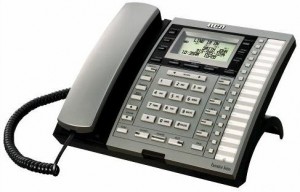Voice Mail is Dead
 People under a certain age have stopped using voice mail, Jill Colvin reports for NYT.
People under a certain age have stopped using voice mail, Jill Colvin reports for NYT.
When it was introduced in the early 1980s, voice mail was hailed as a miracle invention — a boon to office productivity and a godsend to busy households. Hollywood screenwriters incorporated it into plotlines: Distraught heroine comes home, sees blinking red light, listens as desperate suitor begs for another chance to make it all right. Beep! But in an age of instant information gratification, the burden of having to hit the playback button — or worse, dial in to a mailbox and enter a pass code — and sit through “ums” and “ahs” can seem too much to bear.
[…]
“Once upon a time, voice mail was useful,” said Yen Cheong, 32, a book publicist in New York who has transitioned almost entirely to e-mail and text messaging. According to her calculation, it takes 7 to 10 steps to check a voice mail message versus zero to 3 for an e-mail. “If you left a message, I have to dial in, dial in my code,” Ms. Cheong said. “Then I mess up and redial. Then once I hear the message, I need the phone number. I try to write it down, and then I have to rewind the message to hear it again,” she added, feigning exhaustion.
I’m reminded of an Eddie Murphy routine from roughly the era when voice mail was introduced in which he made fun of the advent of one-push automatic windows and wondered about people who were so lazy they couldn’t hold down a button for three seconds.
Still, while I remain sufficiently fit and possessed of the mental stamina to withstand the rigors of checking my messages, I join Matt Yglesias in vastly preferring email. I often forget to check my voice mail for days on end and my wife simply won’t check a message, preferring to return any missed calls that show up on her mobile.
Danielle Citron makes an interesting point, however:
Does this trend have meaningful consequences? Document attachments in our networked age have largely replaced faxes just as the telephone largely displaced the telegraph in an earlier time and common thinking has little regret about these developments. But perhaps this trend may have some lasting significance that might be worth considering. The more we leave to text and less to voice, the more messages may get misconstrued. We cannot tell if someone is joking or is upset from text and more often text can send misleading signals about our emotions (unless the stray emoticon provides some help, which is certainly less prevalent in the professional sphere). It also may have an effect on litigation, to the pleasure, or great pain, of many lawyers. The more we write down, the more we tend to raise problems for ourselves, and hence the more that attorneys have to sift through in discovery. To be sure, voice mails are discoverable, but they are less likely to provoke a series of other voice mails where a text or email can lead to a disastrous series of replies, often written in haste and possibly in anger. This may be a true boon to e-Discovery consultants (as my civil procedure students would wisely suggest). And the more that we write down in digital format, the more chance that such information could be hacked, leaked, or sent to an undesirable audience at the expense of privacy and reputation.
That’s especially interesting given that so many of us are using Gmail and other online messaging systems and no longer delete read messages.






Now you have voice to text so even if you think your leaving a voice mail it gets transcribed and forwarded around. More than once I left a voicemail for my realtor, only to get a reply from someone else in the office referencing my email to her.
So expect to see that voicemail showing up as a email trail in that trial.
We just upgraded our voice mail system at work. It now sends a wmv file of your voice mail to your email in box. You can set it to playback over your computer or over the phone. Of course, as always, you can also access your messages via the phone. Even then, when you access your voice mail from the phone you’re actually accessing your email inbox. I’m not sure if this is a good thing or not.
Still, I almost never get voice mail messages. Today it’s almost always email. Very little is done over the phone. My brother works in IT in a financial services company and he says that they mostly use IM for internal communications and email for everything else.
I haven’t sent a FAX in years.
I hate voicemail, largely because I am one of that tiny minority who makes a point of stating my return number slowly and distinctly. Most people just rattle it off without a care and expect you to listen three times to get it down.
So, whenever I get a new assistant, pretty much the first thing I tell said assistant is my two rules about voicemail:
1) Avoid putting people into my voicemail whenever possible. If the person insists (few do), it’s okay, but I prefer that they take the number down and repeat it back to the caller so I know it’s right; and
2) Never, under any circumstances (up to and including death) allow my mother into my voicemail (because I will get a seven minute message telling me everything she called to discuss and then asking me to call her back so she can tell me again).
Just get a Google Voice account when they become available. It will transcribe voice mails for you. You’ll be able to ascertain the tone, I’m sure.